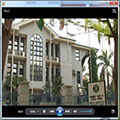
By: James G. Apple, Editor-in-Chief, International
Judicial Monitor
The Economic Community of West African States (ECOWAS), an
organization of 15 West African countries, was established in May, 1975. The 15
states are Benin, Burkina Faso, Cote d’Ivoire, Gambia, Ghana, Guinea-Bissau,
Liberia, Mali, Nigeria, Senegal, Sierra Leone, Togo, Cape Verde, Guinea and
Niger. ECOWAS is designed to “achieve collective self sufficiency for the
member states by means of economic and monetary union creating a single large
trading block.” It is one of the “five regional pillars of the African Economic
Community.”
In October 1999 Justice Ministers of the member states
decided to establish a court of justice to receive and resolve complaints from
members states and “issues relating to defaulting nations.” This action
resulted in the creation of the Community Court of Justice according to specific
articles of the Revised Treaty of ECOWAS.
The Community Court has seven justices who are appointed by
the “Authority of Heads of State of government from nationals of member states.
The term of office for the justices is four years.
The Community Court has both advisory and contentious cases
jurisdiction. Advisory opinions can be given on ”any matter that requires
interpretation of the Community text". Contentious jurisdiction extends to the
following cases:
Failure of a member state to honor obligations
under Community law.
Any dispute relating to the interpretation and
application of acts of the Community.
Disputes between institutions of the Community
and their officials.

 International
Judicial Monitor
International
Judicial Monitor